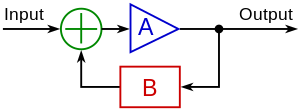 This is a little more about control theory with links to appropriate learning sources. As I said in class I work in IDeA Labs, a research lab in the computer science department.
This is a little more about control theory with links to appropriate learning sources. As I said in class I work in IDeA Labs, a research lab in the computer science department.Control theory is mostly used in systems that have some sort of feedback. This theory was born out of electrical engineering so the original feedback systems that were modeled were electric circuits.
The theory is rich in mathematics with theorems and regulations for stability.
 The general idea is that given some system, if you can observe its outputs (observability) and effect its inputs (controllability) you can design a controller to make it do what you want.
The general idea is that given some system, if you can observe its outputs (observability) and effect its inputs (controllability) you can design a controller to make it do what you want.Here are a couple simple examples:
1) A car and its cruise control. The driver wants the car to go a certain velocity. The cruise control can read the velocity and affect the engine. Despite the variance in weight in the car or gradient of the road, the cruise control can maintain practically a constant velocity.
2) A house and a thermostat. The thermostat controls the temperature of the house by checking the temperature and turning the heater on or off. It doesn't matter how many people are in the house or if a door is open the thermostat with adjust in our to maintain the given temperature.
This was just a small introduction to this field. If you're interested in learning more this is the first book I learned about control theory from. Look at that for open education, the whole thing is online.
This theory can be applied to many different fields from engineering to biology to business to political systems and more.
 |
| Afghan Flag |
Think about how someone can make you feel great or horrible just by reacting to how you are acting.
Maybe we can learn from this and apply it to our daily lives. Everything we do has consequences whether we see them immediately or not.
Let's help stabilize the world.


No comments:
Post a Comment